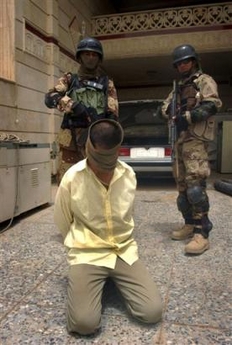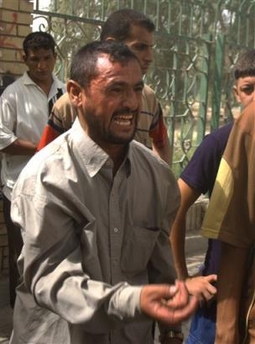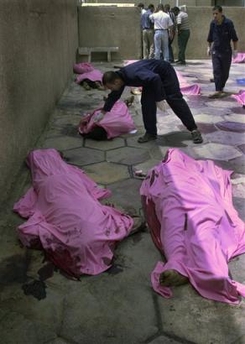Entered into the database on Monday, July 11th, 2005 @ 15:20:23 MST
Writing from London, the writer explains that Iraq's neighbors, either
actively or passively, have been working against the Americans due to the heavy-handed
way in which Washington has gone about its experiment in democracy in Baghdad The Americans, and some Iraqis, have accused Iraq’s neighbors of interfering
in its internal affairs and of looking to ensnare Washington in a quagmire similar
to their famous predicament in Vietnam. This, the accusers say, is because neighboring
countries are worried that they will be infected with the virus of change and
democracy, and because they fear that military and political stability in Iraq
would encourage the United States to move its experiment to another Middle East
nation. Most of Iraq’s neighbors had different and conflicting positions with
regard to the new war that began in March 2003. But all were in agreement that
Washington’s task should not be made easy, that their victory should not
come cheap, and to prevent the Americans from deploying to a new country in
the region, they should be buried up to their necks in the Iraqi “swamp.” KILLING TWO BIRDS WITH ONE STONE There is no doubt that all of the region’s nations were happy that Saddam
Hussein’s regime was toppled, and that they all supported his removal.
But some of these neighbors were also pleased that this war would allow them
to kill two birds with one stone: --The elimination of a reckless, bloody regime that has been a source of fear
and instability for many years. --The blocking of the plans and aspirations of the “fools” in the
U.S. administration, who think that their country is the new Roman Empire, running
the world from one end to the other as if it were the White House’s backyard. Some of Iraq’s neighbors provided no real support to the forced of instability
in that country. But these same countries felt immense relief when American
forces started to sink into the Iraqi mud, especially when the “fools”
in the U.S. administration made it clear that these very same countries are
next on the list for change in the region. Now that it looks as though Washington
has gotten itself into a terrible mess and won’t likely get out of it
in the near future, these countries are less frightened that America’s
dream of moving from square one to square two on the Middle East chessboard
will happen soon. IRAQ AS BATTLEFIELD Other countries in the region, however, have discovered that attack is the
best defense, and that it is safer and more effective for them to wage their
anticipated war with the Americans on Iraqi soil, and not on their own land.
Thus, and from the moment when U.S. forces started to invade Iraq, these countries
have resorted to any means at their disposal to intervene in Iraq’s internal
affairs in any shape or form. The Americans should have realized this before sending their forces to occupy
Iraq. It is illogical to expect countries like Syria and Iran to stand by meekly
and wait for American forces to arrive at the center of their capitals. This
is especially true after all of the thoughtless and idiotic threats uttered
by the “fools” in the U.S. administration (such as Wolfowitz and
Rumsfeld, before they were bloodied by the subsequent war), who said that they
were coming to affect regional change and not just change to a single country. No one could possibly have convinced Iran or Syria not to seek to fight the
United States on Iraqi soil, and to wait patiently with an attitude of sportsmanship
and fair play for the American knife to slit their throats. It was the responsibility
of the “smart” people in the U.S. administration to realize the
dangerous nature of the threats some of their colleagues were uttering. These
threats put all of the region’s countries on maximum alert, some of them
felt targeted, and most would not stand idly by waiting for a fate similar to
Saddam’s. Some Iraqis believe that the position taken by some of its neighbors is a result
of a fear of Iraqi’s experiment with democracy. While it’s true
that some of these countries were terrified at seeing Saddam’s regime
fall under the chains of American tanks and his statues toppled by U.S. soldiers,
the United States made the mistake of not keeping its mouth shut and letting
matters flow naturally, without threats and saber rattling. This would have
allowed Washington to show the peoples of the region (after stabilizating Iraq’s
security situation) a true experiment in democracy, and not a deformed one.
Had the U.S. administration wisely kept silent and let matters flow naturally,
working on developing a mature “Iraqi-democratic experiment” without
noise-making and fist-shaking at the faces of the region’s regimes, leaders
and peoples, then it is certain that the hostile mobilization and rejection
of the region would never have occurred. It is also certain that this “experiment
in democracy” would have seeped smoothly into neighboring countries, where
the region’s peoples would have welcomed it with open arms, and would
have protected and defended it against the tyranny of the present rulers. The biggest mistake the Americans committed was to give the region’s
people (not to mention the regimes) the impression that democracy was coming
on the back of their tanks, and that they will impose this democracy on the
region in the same way that they forced it on the Iraqis. Because of this, all
the peoples and regimes in the region have taken a position of self-defense,
either by keeping silent and compliant, or by being vocal and unyielding. But
both positions had a single goal: To sink the Americans in the Iraqi mud, and
to bury them and their “democracy” with them. Due to the Americans’ deadly mistakes, the region and its inhabitants
no longer look at the “Iraqi experiment” as one worth repeating.
Even for those who were (and still) favored the removal of Saddam Hussein and
his regime, this experiment has become a glaring example of chaos, infighting,
and the indiscriminate shedding of innocent people’s blood. Neighboring
countries no longer fear that Iraq will export democracy to them, but now are
worried that Iraq will turn into another Afghanistan and end up exporting terrorism
in the guise of a thousand “Qaeda” and a hundred thousand Osama
bin Ladens. It is true that some of the region’s regimes feared being infected by
Iraqi democracy, were things to have stabilized. They also feared that American
tanks were rolling in under the banner of forced change. But what is also true
is that now, these regimes and their peoples have become even more frightened
that the Iraqi situation will get worse than it is today. This will lead to
an Iraq that, far from being a model of democracy, is a den of terror more potent
and destructive even the Taliban regime with Osama bin Laden and his al-Qaeda.
An Iraqi is Detained Near a Bomb-Factory
A Man Cries At Scene of Suicide Bombing on Sunday